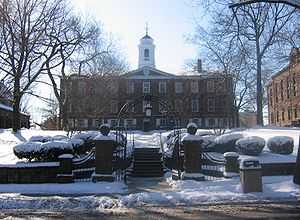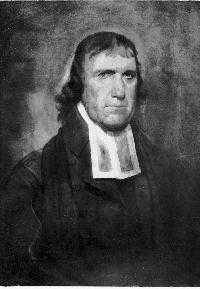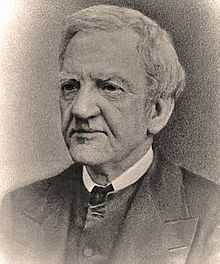List of Rutgers University presidents

The President of Rutgers, The State University of New Jersey (informally called Rutgers University) /ˈrʌtɡərz/ is the chief administrator of Rutgers, The State University of New Jersey. Rutgers was founded by clergymen affiliated with the Dutch Reformed Church in 1766 as Queen's College and was the eighth-oldest of nine colleges established during the American colonial period. Before 1956, Rutgers was a small liberal arts college and became a full university in 1924 with the offering of graduate degree programs and the establishment of professional schools. Today, Rutgers is a public research university with three campuses in the state located in New Brunswick and Piscataway, Newark, and Camden. The state's flagship university with approximately 65,000 students and employing 20,000 faculty and staff members, Rutgers is the largest institution for higher education in New Jersey.
Since 1785, twenty men have served as the institution's president, beginning with the Reverend Jacob Rutsen Hardenbergh, a Dutch Reformed clergyman who was responsible for establishing the college.[1][2] Before 1930, most of the university's presidents were clergymen affiliated with Christian denominations in the Reformed tradition (either Dutch Reformed, Presbyterian, or German Reformed).[2][3] Two presidents were alumni of Rutgers College—the Rev. William H. S. Demarest (Class of 1883) and Philip Milledoler Brett (Class of 1892).[4][5] The current president is Dr. Robert L. Barchi (b. 1946), a neuroscientist and physician who has served in this position since 2012.[6][7][8]
The president serves in an ex officio capacity as a presiding officer within the University's 59-member Board of Trustees and its eleven-member Board of Governors,[9] and is appointed by these boards to oversee day-to-day operations of the University across its three campuses. He is charged with implementing "board policies with the help and advice of senior administrators and other members of the university community."[10] The president is responsible only to those two governing boards—there is no oversight by state officials. Frequently, the president also occupies a professorship in his academic discipline and engages in instructing students.
Presidents of Rutgers University
The following twenty individuals have served as president of Rutgers University from the creation of the office in 1785 to the present. Those marked with their names in bold had graduated from Rutgers. Those marked with "↑" died in office. Where years don't overlap there was a gap of a few months while a suitable candidate was found, this usually occurred when someone died in office, or left unexpectedly to accept another position.
Presidents of Queen's College (1785–1825)

Rutgers was founded as Queen's College on November 10, 1766, and is the eighth-oldest college in the United States and one of the nine Colonial Colleges founded before the American Revolution.[11][12] The university is one of only two colonial colleges that later became public universities.[lower-alpha 1]
In the early days of Queen's College, the trustees wrote to the church's leadership in Amsterdam and at the University of Utrecht to seek candidates for the position of president.[11] In their correspondence, they expressed a wish that a prospective college president possess the following characteristics:[11]
- (1) he was to fill the office of professor of theology,
- (2) to oversee the instruction in languages through tutors until professors could be secured,
- (3) to do more or less the work of a minister on the Lord’s Day,
- (4) to be a man of tried piety,
- (5) to be attached to the Constitution of the Netherlands Church,
- (6) to be a man of thorough learning,
- (7) to be good natured,
- (8) to be free and friendly in conversation,
- (9) to be master of the English language, and
- (10) to be pleased to lecture on Marckii Medulla Theologiae Christianae.[lower-alpha 2]
Its early history, Rutgers was closely allied with the Dutch Reformed Synod of New York which oversaw financial transactions and early selections of professors for Queen's College and the New Brunswick Theological Seminary.[14] The Rev. John Henry Livingston (1746–1825), who served as the college's fourth president and was responsible for establishing the New Brunswick Theological Seminary, was instrumental in raising funds to support the school after several years of being closed resulting from economic difficulties. Just before his death, Livingston raised enough donations and support to place the school on more stable financial footing, including arranging for a generous donation in 1825 from Colonel Henry Rutgers (1745–1830), a wealthy landowner and former Revolutionary War officer from New York City. The trustees of the school renamed the school in honour of Colonel Rutgers in that year.
| # | Portrait | College President | Years in office | Education[2][3] | Career[2][3] | Notes |
|---|---|---|---|---|---|---|
| 1 |  | Jacob Rutsen Hardenbergh (1735–1790) | 1786–1790↑ |
|
|
[2][3] |
| 2 |  | William Linn (1752–1808) | 1791–1795 (pro tempore) |
|
|
[2][3] |
| 3 |  | Ira Condict (1764–1811) | 1795–1810 (pro tempore) |
|
|
[2][3][15][16][17] |
| 4 |  | John Henry Livingston (1746–1825) | 1810–1825↑ |
|
|
[2][3][18] |
Presidents of Rutgers College (1825–1924)
| # | Portrait | College President | Years in office | Education[2][3] | Career and notes[2][3] |
|---|---|---|---|---|---|
| 5 |  | Philip Milledoler (1775–1852) | 1825–1840 |
|
|
| 6 | Abraham Bruyn Hasbrouck (1791–1879) | 1840–1850 |
|
| |
| 7 |  | Theodore Frelinghuysen (1787–1862) | 1850–1862↑ |
|
|
| 8 |  | William Henry Campbell (1808–1890) | 1862–1882 |
|
|
| 9 |  | Merrill Edward Gates (1848–1922) | 1882–1890 |
|
|
| 10 |  | Austin Scott (1848–1922) | 1891–1906 |
|
|
| 11 |  | William Henry Steele Demarest (1863–1956) | 1906–1924 |
|
|
Presidents of Rutgers University (1924–1945)
| # | Portrait | College President | Years in office | Education[2][3] | Career and notes[2][3] |
|---|---|---|---|---|---|
| 12 |  | John Martin Thomas (1869–1952) | 1925–1930 |
|
|
| 13 | Philip Milledoler Brett (1871–1960) | 1930–1931 |
|
| |
| 14 | Robert Clarkson Clothier (1885–1970) | 1932–1951 |
|
|
Presidents of Rutgers, The State University of New Jersey (1945–present)
| # | Portrait | College President | Years in office | Education[2][3] | Career and notes[2][3] |
|---|---|---|---|---|---|
| 14 | — | Robert Clarkson Clothier (1885–1970) | 1932–1951 |
|
See notes above |
| 15 | Lewis Webster Jones (1899–1975) | 1951–1958 |
|
| |
| 16 | Mason Welch Gross (1911–1977) | 1959–1971 |
|
| |
| 17 | Edward J. Bloustein (1925–1989) | 1971–1989↑ |
|
| |
| 18 | Francis Leo Lawrence (1937–2013) | 1990–2002 |
|
| |
| 19 | — | Richard Levis McCormick (b. 1947) | 2002–2012 |
|
|
| 20 | — | Robert Lawrence Barchi (b. 1946) | 2012–present |
|
|
References
Notes
- ↑ The other colonial college—the College of William & Mary in Williamsburg, Virginia—became a state institution by acts of the Virginia legislature in 1888 and 1906.[13]
- ↑ This would be the Johannis Marckii Christianae Theologiae Medulla Didactico-Elenetica, an exegetic and pedagogic work on Dutch Reformed theology written by Johannes van Marck (1655–1731), professor of divinity at Leiden University (1689–1731), and revised by Willem van Irhoven (1698–1760), a professor of theology and later Rector of the University of Utrecht. First published in 1719 in Latin, the title can be rendered from Latin into English as "Johannes van Marck's The Inner Substance (or Pith or Marrow) of Christian Theology.
- ↑ 3.0 3.1 3.2 Princeton University was chartered as the "College of New-Jersey" (Collegii Nova-Caesarea) in 1756. While early sources frequently refer to the school as "Princeton College" or the "College at Princeton", it was never an official name. The school became known as Princeton University when the trustees voted to change the name effective in 1896.
Citations
- ↑ Rutgers, The State University of New Jersey. Rutgers Leaders, Rutgers History: Jacob Rutsen Hardenbergh - Queen’s College President, 1786 to 1790. Retrieved August 17, 2013.
- ↑ 2.0 2.1 2.2 2.3 2.4 2.5 2.6 2.7 2.8 2.9 2.10 2.11 2.12 2.13 Frusciano, Thomas J. "Leadership on the Banks: Rutgers' Presidents, 1766–2004", in The Journal of the Rutgers University Libraries LIII(1) (June 1991).
- ↑ 3.0 3.1 3.2 3.3 3.4 3.5 3.6 3.7 3.8 3.9 3.10 3.11 3.12 Rutgers, The State University of New Jersey. Rutgers Leaders, Rutgers History: Past Presidents. Retrieved August 17, 2013.
- ↑ Rutgers, The State University of New Jersey. Rutgers Leaders, Rutgers History: William Henry Steele Demarest - Rutgers President, 1906 to 1924. Retrieved August 17, 2013.
- ↑ Rutgers, The State University of New Jersey. Rutgers Leaders, Rutgers History: Philip M. Brett - Rutgers Acting President, 1930 to 1931. Retrieved August 17, 2013.
- ↑ Rutgers, The State University of New Jersey - Office of Media Relations. "Robert L. Barchi Named 20th President of Rutgers, The State University of New Jersey: Barchi to take helm of Rutgers on Sept. 1, after successful tenures as Thomas Jefferson University president, University of Pennsylvania provost" (news release) in Rutgers Today (April 11, 2012). Retrieved August 17, 2013.
- ↑ McGlone, Peggy. "Robert Barchi is named Rutgers University president" in The Star-Ledger (April 11, 2012). Retrieved August 17, 2013.
- ↑ Rutgers, The State University of New Jersey - Office of the President. About President Barchi - Biography. Retrieved August 17, 2013.
- ↑ Rutgers, The State University of New Jersey. Governing Boards: Board of Trustees Membership Listing, 2013–2014 and Governing Boards: Board of Governors Membership Listing, 2013–2014. Retrieved August 17, 2013.
- ↑ Rutgers, The State University of New Jersey. About Rutgers: Vision and Continuity - Leadership and Governance. Retrieved August 17, 2013.
- ↑ 11.0 11.1 11.2 Stoeckel, Althea. "Presidents, professors, and politics: the colonial colleges and the American revolution", Conspectus of History (1976) 1(3):45–56.
- ↑ Chapter XXIII. Education. § 13. Colonial Colleges in The Cambridge History of English and American Literature. (Cambridge: Cambridge University Press, 1907–1921; online edition, 2000).
- ↑ Godson, Susan H.; Johnson, Ludwell H.; and Sherman, Richard B. The College of William and Mary: A History. (Williamsburg, Virginia: King and Queen Press, 1994), passim.
- ↑ Demarest, David D. Centennial of the Theological Seminary of the Reformed Church in America, formerly the Reformed Protestant Dutch Church, 1784-1884. (New Brunswick, New Jersey: Board of Publication of the Reformed Church in America, 1885), passim; and Hageman, Howard G. Two Centuries Plus: The Story of the New Brunswick Seminary. (Grand Rapids, MI: William B. Eerdsman Publishing Company, 1984), passim.
- ↑ Centennial, Presbytery of Newton 1817–1917: an adjourned meeting, in the First Presbyterian Church, Washington, N.J.. (Easton, Pennsylvania: Easton Printing Company, 1917), 85.
- ↑ Steele, Richard Holloway. Historical discourse delivered at the celebration of the one hundred and fiftieth anniversary of the First Reformed Dutch Church, New Brunswick, N.J., October 1, 1867. (New Brunswick, New Jersey: Consistory, 1867), 87.
- ↑ Pickersgill, Harold E.; Wall, John Patrick. History of Middlesex County, New Jersey: 1664-1920 (New York: Lewis Publishing Company, 1921), 335–336.
- ↑ Demarest, David D. Centennial of the Theological Seminary of the Reformed Church in America, formerly the Reformed Protestant Dutch Church, 1784-1884. (New Brunswick, New Jersey: Board of Publication of the Reformed Church in America, 1885), 83–91.
- ↑ "Frelinghuysen, Theodore, (1787-1862), Biographical Directory of the United States Congress, 1774–present. Retrieved October 29, 2013.
- ↑ General Alumni Society of New York University. General Alumni Catalogue of New York University, 1833-1905: College, Applied Science, and Honorary Alumni. (Boston: Colonial Press, 1906), 200.
- ↑ Eells, Robert J. Forgotten Saint: The Life of Theodore Frelinghuysen: A Case Study of Christian Leadership. (Lanham, Maryland: University Press of America, 1987), passim.
- ↑ Norwich University Archives and Special Collections. John Martin Thomas Records, 1913-1946. Retrieved August 29, 2013.
- ↑ Critchlow, Donald T. The Brookings Institution, 1916-1952: Expertise and the Public Interest in a Democratic Society (DeKalb, Illinois: Northern Illinois Press, 1984), passim.
- ↑ Rutgers, The State University of New Jersey. "About Richard L. McCormick: Curriculum vitae". Retrieved October 29, 2013.
- ↑ 25.0 25.1 Rutgers, The State University of New Jersey. "About Richard L. McCormick: Biography". Retrieved October 29, 2013.
- ↑ 26.0 26.1 Rutgers, The State University of New Jersey - Office of Media Relations. "Robert L. Barchi Named 20th President of Rutgers, The State University of New Jersey: Barchi to take helm of Rutgers on Sept. 1, after successful tenures as Thomas Jefferson University president, University of Pennsylvania provost" (news release) in Rutgers Today (April 11, 2012). Retrieved August 26, 2013.
External links
| ||||||||||||||||||||